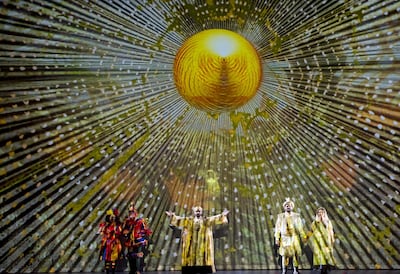Dubai Opera's website promises "spectacular music set around a comic fairy tale" and calls the production an "enchanting masterpiece". Other critics call The Magic Flute the greatest of Wolfgang Amadeus Mozart's operas, evoking child-like wonderment amid a soundtrack of some of the Austrian genius's most sublime compositions. It can be surreal and slapstick, mad or plain daft, with inventive versions of the 1791 opera set in Alice in Wonderland-like lands, British nightclubs and even the world of silent film, influenced by everything from The Handmaid's Tale to Twin Peaks.
Then there are the film adaptations by Swedish auteur Ingmar Bergman – often regarded as one of the best operatic movies of all time – and Sir Kenneth Branagh. Every performance of The Magic Flute is an occasion, and it will be no different when The Armenian National Theatre of Opera and Ballet strike the first note of the overture under the guiding hand of Constantine Orbelian next week.
And yet, with such regular proclamations celebrating the cultural importance of the last Mozart opera to be premiered before he died, it barely seems credible that The Magic Flute could possibly have an undercurrent of misogyny and, even, casual racism. But in the libretto written by Mozart's great friend Emanuel Schikaneder, those accusations can certainly be made.
Is this a case of 21st century political correctness gone mad, or is something more troubling at play here?
The case for the prosecution tends to centre on the treatment of slave chief Monostatos. He’s not one of the central characters – that role is taken by our hero Prince Tamino, saved from a serpent’s clutches by three ladies who claim to work for the Queen Of The Night (whose daughter Pamina has been kidnapped by the seemingly evil Sarastro). But Monostatos is black, in the pay of Sarastro, and called the “wicked Moor” on numerous occasions. He has feelings for Pamina, which go beyond lust towards something more sinister, and there’s a worrying line in his second act aria where he sings, “I must shun love because a black man is ugly … white is beautiful, I need to kiss her.”
It all feels a bit odd in an opera featuring a brave prince with a goofy sidekick dressed as a bird, and it's telling that in recent years some directors have begun to change The Magic Flute to reflect some of the concerns about the original libretto. In many versions, Monostatos is now white – an easy way to divert attention away from the text being racist, but actually just serves to underline his pretty despicable attitude towards women, whatever his colour.
Whether all of this is actually offensive or simply a reflection of changing attitudes is, of course, a moot point. The 'it was a different time' route that has been the tiresome defence of the most serious and serial offenders in the #MeToo scandal may ring true to a certain extent – Mozart and his librettist Emanuel Schikaneder were writing The Magic Flute in 1791, in an environment almost exclusively white and male in character.
David Cairns, in his book Mozart And His Operas, derides Schikaneder as a complete sexist and it's true that though the western world was living through an age called The Enlightenment, it was a more complex and contradictory period for women.
Mozart apologists, too, argue that he toned down much of Schikaneder's text – in the end Pamina becomes a strong and inspiring character (though the line "a woman does little, chatters a great deal" still made the final cut) and with this opera, Mozart created some of The Magic Flute's most stirring musical moments for his female parts. And it can – and should – be argued that changing the source material to suit 21st century tastes diminishes the historical power of the original. After all, the questionable views that set alarm bells ringing in The Magic Flute hardly serve to support misogyny or racism more than 200 years later – they simply reflect how much the world has changed. And though it's taking matters too far to suggest he and Schikaneder were shining a thought-provoking light on the Moors of the age, even these tiny unpalatable details do serve to show the kind of world in which they lived.
But it takes a peculiar kind of joyless pedant to pick such deep holes in The Magic Flute. It's a story straight out of your favourite Disney film (or, indeed, pantomime): a prince is ordered by a strange queen to rescue a kidnapped princess – all with the aid of a magic flute. The harder Tamino tries, the further away he seems from his goal. There's romance, comedy, adventure and peril – and the glory of the original material is that it allows directors to play the whole thing for laughs or find deeper, darker meanings.
This summer, Birmingham Opera Company sparked controversy with its experimental Magic Flute at the Macerata Opera Festival. Graham Vick revised the original plot, replacing the serpent with a bulldozer poised to destroy a migrant camp and took aim at banks, tech companies and religion. He managed to shock his audience and the critics – which was surely the intention – but it proved that opera still has the power to do so.
The Armenian National Theatre of Opera and Ballet’s version is likely to be far more straightforward in Dubai this week.
There's beauty in a faithful retelling, too, and its combination of spoken dialogue, arias and ensembles (singspiel) all comes together in the Queen Of The Night's famous and grandiose aria, "Hell's vengeance boils in my heart", in which she orders her daughter Pamina to kill Sarastro if she wants to avoid being disowned and cursed. It's not just a feat of technical brilliance - there are some incredibly high notes asked of the soloist here – but an expression of genuine anger.
This sublime aria has to be experienced live to be believed. Perhaps that's why Mozart's Magic Flute has withstood all that has been thrown at it in recent years; because at that moment in the second act, there is probably no more astounding experience in all of opera.
The Magic Flute will be on show at Dubai Opera from September 13 to 15
_______________________
Read more:
The challenge of bringing ‘Carmen’ from Yerevan to Dubai
Sharjah celebrates opening of Africa Hall with concerts
From Jordan to Oman: 5 shows not to miss in the region
_______________________


